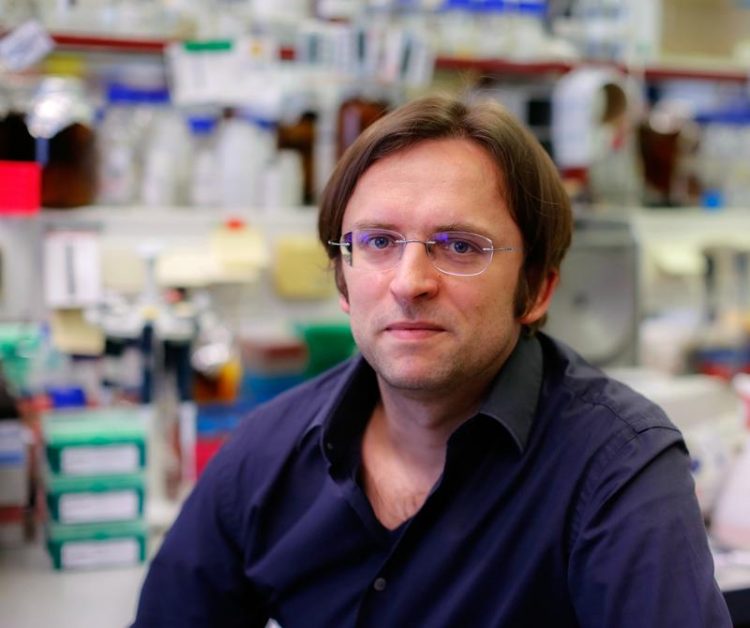IMP-Researcher Johannes Zuber wins German Cancer Prize

IMP Group Leader Johannes Zuber Copyright: IMP/Fischer
The German Cancer Prize (Deutscher Krebspreis) is one of the most prestigious scientific awards in the German speaking world and annually honours researchers for groundbreaking discoveries in the field of oncology.
This year's award acknowledges the achievements of Johannes Zuber, whose contributions have shaped the field of functional cancer genetics. Together with his team at the IMP, the physician scientist uses innovative genetic approaches to identify and study genes that are required for the survival of cancer cells and serve as candidate targets for the development of new cancer therapies.
Through developing and applying optimised RNAi-screening methods, Zuber discovered the gene BRD4 as a genetic vulnerability and candidate target for the treatment of acute myeloid leukemia (AML), an aggressive form of blood cancer.
After BRD4 inhibitors have already shown promising effects in AML and other malignancies, his research team could recently identify molecular mechanisms that render leukemia cells resistant to these agents. These insights are of great importance for the future development of BRD4 inhibitors in the clinic.
“This award is a great honour and encouragement to further expand our research in the field of functional cancer genetics”, says Johannes Zuber. He points out that new genetic tools offer fascinating opportunities for finding and probing therapeutic targets such as BRD4: “We are currently witnessing a true revolution in functional genetics, which will enable us to search for better cancer therapies in entirely new ways.”
Johannes Zuber, born 1974 in Dresden, completed his medical studies and a doctoral thesis in molecular cancer research at Berlin’s Charité Medical School in 2003. During his residency in hematology/oncology at the Charité University Hospital, leukemia became the focus of his scientific interest. In 2005, Zuber moved to the US to join Scott Lowe's lab at the renowned Cold Spring Harbor Laboratory, where he developed innovative genetic models to study targeted therapies in leukemia. In 2011, he founded his own lab at the IMP in Vienna.
The German Cancer Prize is endowed with 22,500 Euros and awarded annually by the “Deutsche Krebsgesellschaft” (German Cancer Society) and the “Deutsche Krebsstiftung” (German Cancer Foundation) for groundbreaking work in three categories: experimental research, translational research and clinical research in oncology.
The criteria are exceptional scientific quality and originality of research in the field of oncology. Former awardees include renowned scientists such as Nobel laureate Harald zur Hausen, Peter Krammer, Axel Ullrich or Walter Birchmeier. Johannes Zuber is the first recipient who is affiliated with an institution in Austria.
About the IMP
The Research Institute of Molecular Pathology (IMP) in Vienna is a basic biomedical research institute largely sponsored by Boehringer Ingelheim. With over 200 scientists from 37 nations, the IMP is committed to scientific discovery of fundamental molecular and cellular mechanisms underlying complex biological phenomena. Research areas include cell and molecular biology, neurobiology, disease mechanisms and computational biology.
Media Contact at the IMP
Dr. Heidemarie Hurtl
IMP Communications
Research Institute of Molecular Pathology
Dr. Bohr-Gasse 7
A 1030 Vienna
hurtl@imp.ac.at
+43 (0)1 79730 3625
http://www.imp.ac.at/research/research-groups/zuber-group/
http://www.imp.ac.at/news/press-releases/
Media Contact
All latest news from the category: Awards Funding
Newest articles

A new puzzle piece for string theory research
Dr. Ksenia Fedosova from the Cluster of Excellence Mathematics Münster, along with an international research team, has proven a conjecture in string theory that physicists had proposed regarding certain equations….

Climate change can cause stress in herring larvae
The occurrence of multiple stressors undermines the acclimatisation strategies of juvenile herring: If larvae are exposed to several stress factors at the same time, their ability to respond to these…

Making high-yielding rice affordable and sustainable
Plant biologists show how two genes work together to trigger embryo formation in rice. Rice is a staple food crop for more than half the world’s population, but most farmers…



